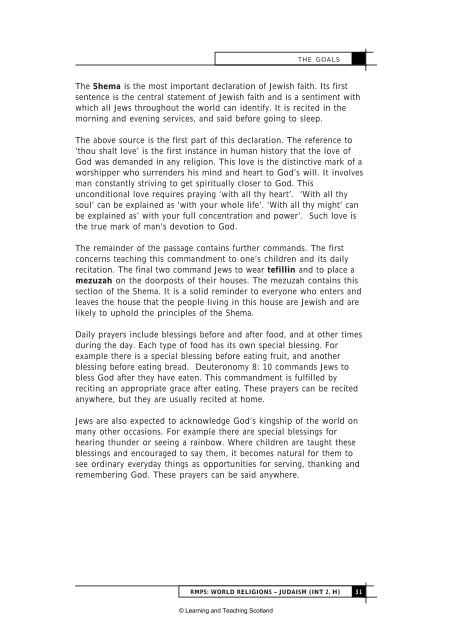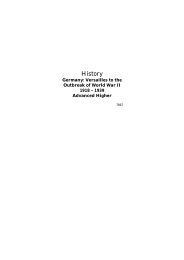RMPS - Int2/Higher - World Religions - Judaism - Education Scotland
RMPS - Int2/Higher - World Religions - Judaism - Education Scotland
RMPS - Int2/Higher - World Religions - Judaism - Education Scotland
Create successful ePaper yourself
Turn your PDF publications into a flip-book with our unique Google optimized e-Paper software.
THE GOALS<br />
The Shema is the most important declaration of Jewish faith. Its first<br />
sentence is the central statement of Jewish faith and is a sentiment with<br />
which all Jews throughout the world can identify. It is recited in the<br />
morning and evening services, and said before going to sleep.<br />
The above source is the first part of this declaration. The reference to<br />
‘thou shalt love’ is the first instance in human history that the love of<br />
God was demanded in any religion. This love is the distinctive mark of a<br />
worshipper who surrenders his mind and heart to God’s will. It involves<br />
man constantly striving to get spiritually closer to God. This<br />
unconditional love requires praying ‘with all thy heart’. ‘With all thy<br />
soul’ can be explained as ‘with your whole life’. ‘With all thy might’ can<br />
be explained as’ with your full concentration and power’. Such love is<br />
the true mark of man’s devotion to God.<br />
The remainder of the passage contains further commands. The first<br />
concerns teaching this commandment to one’s children and its daily<br />
recitation. The final two command Jews to wear tefillin and to place a<br />
mezuzah on the doorposts of their houses. The mezuzah contains this<br />
section of the Shema. It is a solid reminder to everyone who enters and<br />
leaves the house that the people living in this house are Jewish and are<br />
likely to uphold the principles of the Shema.<br />
Daily prayers include blessings before and after food, and at other times<br />
during the day. Each type of food has its own special blessing. For<br />
example there is a special blessing before eating fruit, and another<br />
blessing before eating bread. Deuteronomy 8: 10 commands Jews to<br />
bless God after they have eaten. This commandment is fulfilled by<br />
reciting an appropriate grace after eating. These prayers can be recited<br />
anywhere, but they are usually recited at home.<br />
Jews are also expected to acknowledge God’s kingship of the world on<br />
many other occasions. For example there are special blessings for<br />
hearing thunder or seeing a rainbow. Where children are taught these<br />
blessings and encouraged to say them, it becomes natural for them to<br />
see ordinary everyday things as opportunities for serving, thanking and<br />
remembering God. These prayers can be said anywhere.<br />
<strong>RMPS</strong>: WORLD RELIGIONS – JUDAISM (INT 2, H) 31<br />
© Learning and Teaching <strong>Scotland</strong>
















